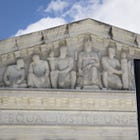Presidential power, revolutionary trolling, doing what you love: Weekend reads for July 6, 2024
Some links worth your time for the holiday weekend
We hope you all had a great Fourth of July and you’re looking ahead to a weekend of rest and a bit of extra time with the people you love. We’d be remiss, of course, not to note that it’s been a challenging time for the American experiment, so we expect that for many it’ll be an opportunity for some reflection and reading as well.
In this week’s readings — the links we collect each weekend for our paid subscribers — we’ve collected some cautionary tales from the history of our democracy, a lesson from the U.K., and some warnings about the stakes in the elections ahead. And we’ve got a couple of timely reminders that the natural world is repairable, despite all we’ve done to mess it up — something that should give us some faith in ourselves.
As always, we hope the articles we’ve collected inspire, entertain, and remind everyone that though we might be living in troubled times, we can approach the future with hope.
In case you missed it
In a downright distressing week, we turned to constitutional scholar Aziz Rana to help us make sense of the Supreme Court’s string of transformational term’s-end rulings and how they grew out of a long tradition of mythmaking about the Constitution that’s distorted the way Americans understand politics.
We continue to see this steady growth of presidential power even as all sides in this debate wrap themselves in the mantle of constitutional veneration. Constitutional veneration is a cultural practice. Yes, it can provide some constraints. But it ends up providing legitimacy to an overarching system that continues to replicate impunity.
It’s always worth revisiting Frederick Douglass’ 1852 address on the Fourth, and this year, we hope it serves as a reminder of the unfinished American project and its unwritten future, and of the need to act with hope in times like these.
We need the storm, the whirlwind, and the earthquake. The feeling of the nation must be quickened; the conscience of the nation must be roused; the propriety of the nation must be startled; the hypocrisy of the nation must be exposed; and its crimes against God and man must be proclaimed and denounced.
And we put together some readings on presidential immunity, from our archives, the Court itself, and —of course — Richard Nixon.
The Court now confronts a question it has never had to answer in the Nation's history: Whether a former President enjoys immunity from federal criminal prosecution. The majority thinks he should, and so it invents an atextual, ahistorical, and unjustifiable immunity that puts the President above the law.
Special event
A reminder that this coming Wednesday, July 10, at 12:30 PM Eastern we’ll be having a live conversation with Senator Chris Murphy, discussing his work on solving the crisis of unhappiness, his bipartisan initiative to bring people together to work for the common good, and more. We invite our paid subscribers to attend; you’ll find all the details in the post linked below.
A request for those who haven’t yet joined us: The interviews and essays that we share here take research and editing and much more. We work hard, and we are eager to bring on more writers, more voices. But we need your help to keep this going. Join us today to support the kind of independent media you want to exist.
And today and through the holiday weekend we’re offering new paid subscribers a special discount of 20 percent. You will lock in this lower price forever if you join us now!
Readings
The raggly flag that ties us together
It is Dial’s punning signifier for one final moralism: We have created a hard bed for ourselves, and the only hope and recourse for humanity is the realization that we must find a way to lie in it together. [Souls Grown Deep]
Trolling since the founding
“This small group of vigilantes upended the peaceful settlement at Conestoga Indiantown, and set a violent precedent for westward conquest… Supporters of the Paxton Boys and their critics chose the press as their weapon of choice, battling in print in a way not so different from the Twitter wars of today.” [Humanities]








